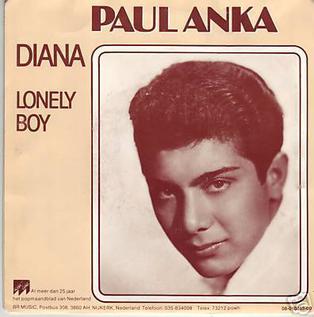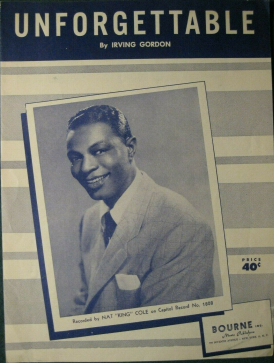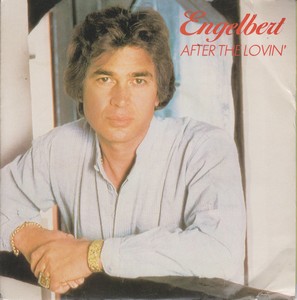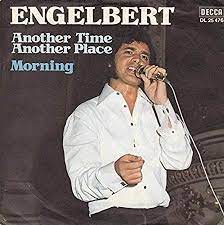Related Research Articles

"Strangers in the Night" is a song composed by Bert Kaempfert with English lyrics by Charles Singleton and Eddie Snyder. Kaempfert originally used it under the title "Beddy Bye" as part of the instrumental score for the movie A Man Could Get Killed. The song was made famous in 1966 by Frank Sinatra.

"Mr. Sandman" is a popular song written by Pat Ballard and published in 1954. It was first recorded in May of that year by Vaughn Monroe & his orchestra and later that year by The Chordettes and the Four Aces. The song's lyrics convey a request to "Mr. Sandman" to "bring me a dream" – the traditional association of the folkloric figure. The pronoun used to refer to the desired dream is often changed depending on the sex of the singer or group performing the song, as the original sheet music publication, which includes male and female versions of the lyrics, intended.

"Love Rollercoaster", sometimes rendered as "Love Roller Coaster", is a song by American funk/R&B band Ohio Players, originally featured on their 1975 album Honey. It was composed by William Beck, Leroy Bonner, Marshall Jones, Ralph Middlebrooks, Marvin Pierce, Clarence Satchell, and James Williams. It was a number-one U.S. hit in January 1976, and was certified gold. In Canada, the song spent two weeks at number two. "Love Rollercoaster" was covered by American rock band Red Hot Chili Peppers for the soundtrack of the 1996 animated movie Beavis and Butt-Head Do America.

Arnold George Dorsey, known professionally as Engelbert Humperdinck, is a British pop singer who has been described as "one of the finest middle-of-the-road balladeers around". He achieved international prominence in 1967 with his recording of "Release Me".

"Diana" is a song written and first performed by Paul Anka, who recorded it in May 1957 at Don Costa’s studio in New York City. Anka stated in his autobiography that the song was inspired by a girl named Diana Ayoub, whom he had met at his church and community events, and had developed a crush on. Session musicians on the record included George Barnes playing lead guitar, Bucky Pizzarelli playing the "Calypso" riff on guitar, Irving Wexler on piano, Jerry Bruno on bass, and Panama Francis on drums. The song was recorded in May 1957 at RCA Victor Studios in New York. Backup singers included Artie Ripp.

"Unforgettable" is a popular song written by Irving Gordon. The song's original working title was "Uncomparable,” however, the music publishing company asked Gordon to change it to "Unforgettable.” The song was published in 1951.

"After the Lovin'" is a single performed by Engelbert Humperdinck, produced by Joel Diamond and Charlie Calello, and composed by Ritchie Adams with lyrics by Alan Bernstein. The single was a U.S. top-ten hit in late 1976/early 1977, reaching number eight on the Billboard Hot 100 and number five on the Cash Box Top 100. It became a RIAA gold record. It is ranked as the 61st biggest U.S. hit of 1977. The song also reached number 40 on the country singles chart and spent two weeks atop the easy listening chart. It was Humperdinck's final Top 40 Billboard hit.
"Quando quando quando" is an Italian pop song from 1962, in the bossa nova style, with music written by Tony Renis and lyrics by Alberto Testa. The song, originally recorded in two different versions by Tony Renis and Emilio Pericoli, competed in the Sanremo Music Festival in 1962, where it placed fourth, and later became a commercial success in Italy, topping the Musica e dischi singles chart. American entertainer Pat Boone, who recorded the song in 1962, sang the English lyrics written by Ervin Drake.

"Have I Told You Lately" is a song written and recorded by Northern Irish singer and songwriter Van Morrison for his nineteenth studio album, Avalon Sunset (1989). It is a romantic ballad that is often played at weddings, although it was originally written as a prayer.

"The Last Waltz" is a ballad, written by Barry Mason and Les Reed. It was one of Engelbert Humperdinck's biggest hits, spending five weeks at number 1 on the UK Singles Chart, from September 1967 to October 1967, and has since sold over 1.17 million copies in the United Kingdom.

"The Most Beautiful Girl" is a song recorded by Charlie Rich and written by Billy Sherrill, Norro Wilson, and Rory Bourke. The countrypolitan ballad reached No. 1 in the United States in 1973 on three Billboard music charts: the pop chart, the country chart, and the adult contemporary chart, as well as in Canada on three RPM charts: the RPM 100 Top Singles chart, the Country Tracks chart, and the Adult Contemporary chart. Billboard ranked it as the No. 23 song for 1974.
"Release Me", is a popular song written by Eddie "Piano" Miller and Robert Yount in 1949. Four years later it was recorded by Jimmy Heap & the Melody Masters, and with even better success by Patti Page (1954), Ray Price (1954), and Kitty Wells (1954). Jivin' Gene [Bourgeois] & the Jokers recorded the tune in 1960, and that version served as an inspiration for Little Esther Phillips, who reached number one on the R&B chart and number eight on the pop chart with her big-selling cover. The Everly Brothers followed in 1963, along with Lucille Starr including a translation in French (1964), Jerry Wallace (1966), Dean Martin (1967), Engelbert Humperdinck (1967) who was number one on the UK Singles Chart and many others in the years after such as Jewels Renauld (2022).
"Am I That Easy to Forget" is a popular song written by country music singer Country Johnny Mathis who later sold the publishing rights to W.S. Stevenson and published in 1958. Belew recorded his song in Nashville on December 17, 1958, and released the single in March 1959, when it reached number nine on the U.S. country music chart. Other country music artists who have recorded cover versions of the song include Skeeter Davis, Ernest Tubb (1960), Jerry Wallace (1962), Gene Vincent (1966), George Jones (1967), Patti Page (1968), Ann-Margret & Lee Hazlewood (1969), Jim Reeves and Prairie Oyster (1991).
"Moon Over Naples" is a 1965 instrumental composed and recorded by German bandleader Bert Kaempfert. The instrumental version reached No. 6 on Billboard's Adult Contemporary chart. It won a BMI Award in 1968.

"Quando m'innamoro" is a 1968 Italian song written by Daniele Pace, Mario Panzeri and Roberto Livraghi and sung with a double performance by Anna Identici and by The Sandpipers at the 1968 Sanremo Music Festival, in which it came 6th.
"Too Beautiful to Last" is a song recorded by Engelbert Humperdinck, which was the theme from the 1971 historical biopic Nicholas and Alexandra.

"Winter World of Love" is a song recorded by Engelbert Humperdinck, which was released on his eponymous album and as a single in 1969.
"Les Bicyclettes de Belsize" is a song written and composed by Les Reed and Barry Mason. Used as the theme song of the 1968 eponymous musical film, it was mimed by Anthony May in the movie and sung by Johnny Worth. As a 7" 45rpm single, it was a big hit that year, in parallel English and French versions, for Engelbert Humperdinck and Mireille Mathieu, respectively. The French version premiered on Mathieu's 1968 Columbia album Les Bicyclettes de Belsize; the English version premiered as a single in 1968, and was then included on Humperdinck's 1969 album Engelbert.
"I'm a Better Man" was written by Burt Bacharach and Hal David. It was a hit for Engelbert Humperdinck in 1969. It was a follow-up to the previous release, "The Way It Used To Be".

"Another Time, Another Place" is a song by Engelbert Humperdinck, the title track of his 1971 LP. It became an international hit, reaching No. 13 in the United Kingdom and No. 16 in Canada.
References
- ↑ "Engelbert – Engelbert Humperdinck". AllMusic . Retrieved March 27, 2018.
- 1 2 3 4 Engelbert Humperdinck - The Way it Used to Be, Ultratop. Accessed July 4, 2016.
- ↑ "From the Music Capitals of the World", Billboard , April 19, 1969. p. 26. Retrieved March 26, 2018.
- ↑ Isabella Iannetti - Melodia, norwegiancharts.com. Retrieved March 26, 2018.
- 1 2 Engelbert Humperdinck - Full Official Chart History, Official Charts Company . Retrieved March 26, 2018.
- 1 2 3 4 "Hits of the World", Billboard , April 26, 1969. p. 64. Retrieved March 26, 2018.
- 1 2 "Hits of the World", Billboard , July 5, 1969. p. 77. Retrieved March 27, 2018.
- 1 2 "The Irish Charts – Search Results – The Way it Used to Be". Irish Singles Chart. Retrieved March 26, 2018.
- 1 2 Engelbert Humperdinck - The Way It Used to Be, norwegiancharts.com. Retrieved March 26, 2018.
- 1 2 Engelbert Humperdinck - The Way It Used to Be, Ultratop. Retrieved March 26, 2018.
- 1 2 "Hits of the World", Billboard , April 5, 1969. p. 64. Retrieved March 27, 2018.
- 1 2 Hot 100 - Engelbert Humperdinck The Way It Used to Be Chart History, Billboard.com. Retrieved March 26, 2018.
- ↑ Adult Contemporary - Engelbert Humperdinck The Way It Used to Be Chart History, Billboard.com. Retrieved March 26, 2018.
- 1 2 "Billboard Top 40 Easy Listening", Billboard , April 26, 1969. p. 50. Retrieved March 26, 2018.
- ↑ "Top Records of 1969", Billboard , December 27, 1969. p. 17. Retrieved March 26, 2018.
- ↑ "RPM 100", RPM Weekly , Volume 11, No. 9, April 28, 1969. Retrieved March 26, 2018.
- ↑ "Young Adult", RPM Weekly , Volume 11, No. 9, April 28, 1969. Retrieved March 26, 2018.
- ↑ Engelbert Humperdinck - The Way it Used to Be, Dutch Charts. Retrieved March 16, 2018.
- ↑ Engelbert Humperdinck - The Way It Used to Be, Media Markt Top 40. Retrieved March 16, 2018.
- ↑ NZ Listener chart summary, Flavour of New Zealand. Retrieved March 27, 2018.
- ↑ "Cash Box Top 100", Cash Box , May 3, 1969. p. 4. Retrieved March 27, 2018.
- ↑ "100 Top Pops", Record World , Vol. 23, No. 1141, Special Section. April 26, 1969. Retrieved March 27, 2018.
- ↑ "Top Non-Rock", Record World , Vol. 23, No. 1141, Special Section. April 26, 1969. p. 20. Retrieved March 27, 2018.
- ↑ "Juke Box Top 25", Record World , April 12, 1969. p. 18. Retrieved March 27, 2018.
- ↑ "Traces of Love – Bert Kaempfert & His Orchestra". AllMusic . Retrieved March 27, 2018.
- ↑ "Hits of the World", Billboard , June 21, 1969. p. 94. Retrieved March 27, 2018.
- ↑ Jimmy Fontana - Melodia, Ultratop. Retrieved March 27, 2018.